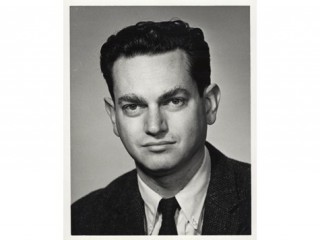
Marshall Warren Nirenberg biography
Date of birth : 1927-04-10
Date of death : 2010-01-15
Birthplace : New York City, New York, U.S.
Nationality : American
Category : Science and Technology
Last modified : 2011-10-19
Credited as : biochemist, deciphering the portion of DNA, Nobel Prize in physiology or medicine
Marshall Warren Nirenberg was an American biochemist and geneticist best known for deciphering the portion of DNA (deoxyribonucleic acid) that is responsible for the synthesis of the numerous protein molecules which form the basis of living cells. In 1968 he was awarded the Nobel Prize for physiology or medicine.
Nirenberg's research has helped to unravel the DNA genetic code, aiding, for example, in the determination of which genes code for certain hereditary traits. For his contribution to the sciences of genetics and cell biochemistry, Nirenberg was awarded the 1968 Nobel Prize in physiology or medicine with Robert W. Holley and Har Gobind Khorana.
Nirenberg was born in New York City on April 10, 1927, and moved to Florida with his parents, Harry Edward and Minerva (Bykowsky) Nirenberg, when he was ten years old. He earned his B.S. in 1948 and his M.Sc. in biology in 1952 from the University of Florida. Nirenberg's interest in science extended beyond his formal studies. For two of his undergraduate years he worked as a teaching assistant in biology, and he also spent a brief period as a research assistant in the nutrition laboratory. In 1952, Nirenberg continued his graduate studies at the University of Michigan, this time in the field of biochemistry. Obtaining his Ph.D. in 1957, he wrote his dissertation on the uptake of hexose, a sugar molecule, by ascites tumor cells.
Shortly after earning his Ph.D., Nirenberg began his investigation into the inner workings of the genetic code as an American Cancer Society (ACS) fellow at the National Institutes of Health (NIH) in Bethesda, Maryland. Nirenberg continued his research at the NIH after the ACS fellowship ended in 1959, under another fellowship from the Public Health Service (PHS). In 1960, when the PHS fellowship ended, he joined the NIH staff permanently as a research scientist in biochemistry.
After only a brief time conducting research at the NIH, Nirenberg made his mark in genetic research with the most important scientific breakthrough since James D. Watson and Francis Crick discovered the structure of DNA in 1953. Specifically, he discovered the process for unraveling the code of DNA. This process allows scientists to determine the genetic basis of particular hereditary traits. In August of 1961, Nirenberg announced his discovery during a routine presentation of a research paper at a meeting of the International Congress of Biochemistry in Moscow.
Nirenberg's research involved the genetic code sequences for amino acids. Amino acids are the building blocks of protein. They link together to form the numerous protein molecules present in the human body. Nirenberg discovered how to determine which sequences patterns code for which amino acids (there are about 20 known amino acids).
Nirenberg's discovery has led to a better understanding of genetically determined diseases and, more controversially, to further research into the controlling of hereditary traits, or genetic engineering. For his research, Nirenberg was awarded the 1968 Nobel Prize for physiology or medicine. He shared the honor with scientists Har Gobind Khorana and Robert W. Holley. After receiving the Nobel Prize, Nirenberg switched his research focus to other areas of biochemistry, including cellular control mechanisms and the cell differentiation process.
Since first being hired by the NIH in 1960, Nirenberg has served in different capacities. From 1962 until 1966 he was Head of the Section for Biochemical Genetics, National Heart Institute. Since 1966 he has been serving as the Chief of the Laboratory of Biochemical Genetics, National Heart, Lung and Blood Institute. Other honors bestowed upon Nirenberg, in addition to the Nobel Prize, include honorary membership in the Harvey Society, the Molecular Biology Award from the National Academy of Sciences (1962), National Medal of Science presented by President Lyndon B. Johnson (1965), and the Louisa Gross Horwitz Prize for Biochemistry (1968). Nirenberg also received numerous honorary degrees from distinguished universities, including the University of Michigan (1965), University of Chicago (1965), Yale University (1965), University of Windsor (1966), George Washington University (1972), and the Weizmann Institute in Israel (1978). Nirenberg is a member of several professional societies, including the National Academy of Sciences, the Pontifical Academy of Sciences, the American Chemical Society, the Biophysical Society, and the Society for Developmental Biology.
Nirenberg married biochemist Perola Zaltzman in 1961. While described as being a reserved man who engages in little else besides scientific research, Nirenberg has been a strong advocate of government support for scientific research, believing this to be an important factor for the advancement of science.
















